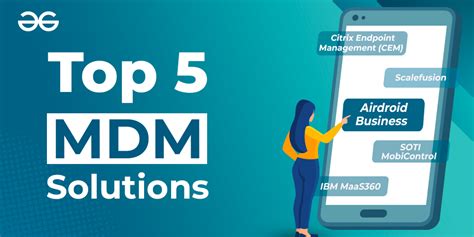In today's digital landscape, mobile devices have become an essential tool for both personal and professional use. With the rise of mobile applications, managing and securing these devices has become a significant challenge for organizations. Mobile Device Management (MDM) solutions have emerged as a vital tool to help businesses tame the chaos of mobile app management. In this article, we will explore five ways MDM solutions can help organizations regain control over their mobile app landscape.
The Importance of MDM in Mobile App Management
With the proliferation of mobile devices in the workplace, managing and securing mobile apps has become a daunting task. The risks associated with mobile apps, such as data breaches and malware infections, can have severe consequences for businesses. MDM solutions provide a centralized platform to manage and secure mobile devices, applications, and data. By implementing an MDM solution, organizations can ensure that their mobile devices and apps are compliant with company policies and regulations.
1. App Distribution and Management
One of the primary challenges of mobile app management is distributing and managing apps across multiple devices. MDM solutions provide a centralized platform to distribute, manage, and update apps across all devices. With MDM, organizations can:
- Distribute apps to specific devices or groups
- Manage app updates and patches
- Restrict access to certain apps or features
- Monitor app usage and performance

2. Security and Compliance
Mobile apps can pose significant security risks to organizations, including data breaches and malware infections. MDM solutions provide a range of security features to protect mobile devices and apps, including:
- Encryption and secure data storage
- Malware detection and removal
- Firewall and intrusion prevention
- Compliance with regulatory requirements

3. Data Protection
Mobile devices often contain sensitive business data, which can be compromised if devices are lost or stolen. MDM solutions provide features to protect business data, including:
- Data encryption and secure storage
- Remote wipe and device locking
- Data loss prevention (DLP) policies
- Secure data sharing and collaboration

4. Containerization
Containerization is a feature of MDM solutions that separates business and personal data on mobile devices. This ensures that business data is secure and protected, while personal data remains private. Containerization features include:
- Separate containers for business and personal data
- Secure data sharing and collaboration
- Encryption and secure storage
- Compliance with regulatory requirements

5. Analytics and Reporting
MDM solutions provide analytics and reporting features to help organizations monitor and manage their mobile app landscape. These features include:
- App usage and performance monitoring
- Device and user analytics
- Security and compliance reporting
- Customizable dashboards and reports

Gallery of Mobile Device Management





FAQs
What is Mobile Device Management (MDM)?
+Mobile Device Management (MDM) is a solution that helps organizations manage and secure mobile devices, applications, and data.
What are the benefits of MDM solutions?
+MDM solutions provide a range of benefits, including improved security, compliance, data protection, and analytics and reporting.
How do MDM solutions protect business data?
+MDM solutions protect business data through features such as encryption, secure storage, remote wipe, and data loss prevention policies.
In conclusion, MDM solutions provide a range of features and benefits to help organizations tame the chaos of mobile app management. By implementing an MDM solution, businesses can ensure that their mobile devices and apps are secure, compliant, and protected. We hope this article has provided valuable insights into the world of MDM solutions and their benefits. If you have any further questions or comments, please feel free to share them below.
